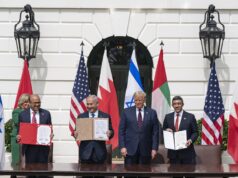Typically, the rules for Arab diplomats in foreign countries have taken into account some of the excesses that come with the post. In Saudi Arabia, for example, like baseball in America, it usually takes more than one strike to be called out. Take the case of Ali Ahmad Asseri – a ranking Saudi diplomat who told NBC News Saturday that he is seeking political asylum in the United States. Asseri told NBC News that he fears for his life if he is forced to return to his country. Clearly, he must have overstepped his bounds, but how? According to the report, Saudi officials refused to renew his diplomatic passport and terminated his job after discovering he was gay (strike one) and was close friends with a Jewish woman (strike two). Other rumors have it that Asseri was close enough with the Jewish woman that she would drive him around town while he would sit in the front seat beside her (strike three). “My life is in a great danger here and if I go back to Saudi Arabia, they will kill me openly in broad daylight,” Asseri said in an email to NBC. Saudi officials are demanding his return.
Homosexuality is considered illegal in Saudi Arabia and is treated as a crime. Earlier this year, a 27-year-old Saudi man was charged with homosexuality and impersonating a police officer when he posted a comical video of himself on the Internet discussing popular culture, showing off his chest hair, and flirting with the camera man. He was sentenced to 1,000 lashes and one year in prison, and was fined 5,000 rials (U.S. $1,333).
Asseri was reportedly questioned by the Department of Homeland Security at the end of last month after he applied for asylum. He is making the request on the grounds of being a member of a particular group that would subject him to persecution if he returns home.
——–
In another tale of things that are bound to happen in the Middle East, Egypt’s state-run Al-Ahram newspaper published

Original photo captured by Reuters on September 3, 2010. |
|
a doctored photo on Tuesday of Egyptian President Hosni Mubarak leading U.S. president Barack Obama, Palestinian President Mahmoud Abbas, Israeli Prime Minister Benjamin Netanyahu, and Jordanian King Abdullah II as they walked together while meeting in Washington for the launch of renewed peace talks earlier this month.

Doctored version of the Reuters image with Mubarak in the lead published by Al-Ahram on September 14, 2010. |
|
The original photo, which was published by Reuters on September 3, shows President Mubarak walking at the rear of his counterparts and peace-talk co-sponsors. Al-Ahram published the manipulated image on the first day of the second round of talks held in Egypt’s Sharm al-Sheikh.
Samy Abdel Aziz, dean of the faculty of mass communication at Cairo University, said the president’s perceived importance should not be affected by his position in a photo. “Formal aspects do not add to realities,” he said.
In other words, life continues as usual in the Middle East.





